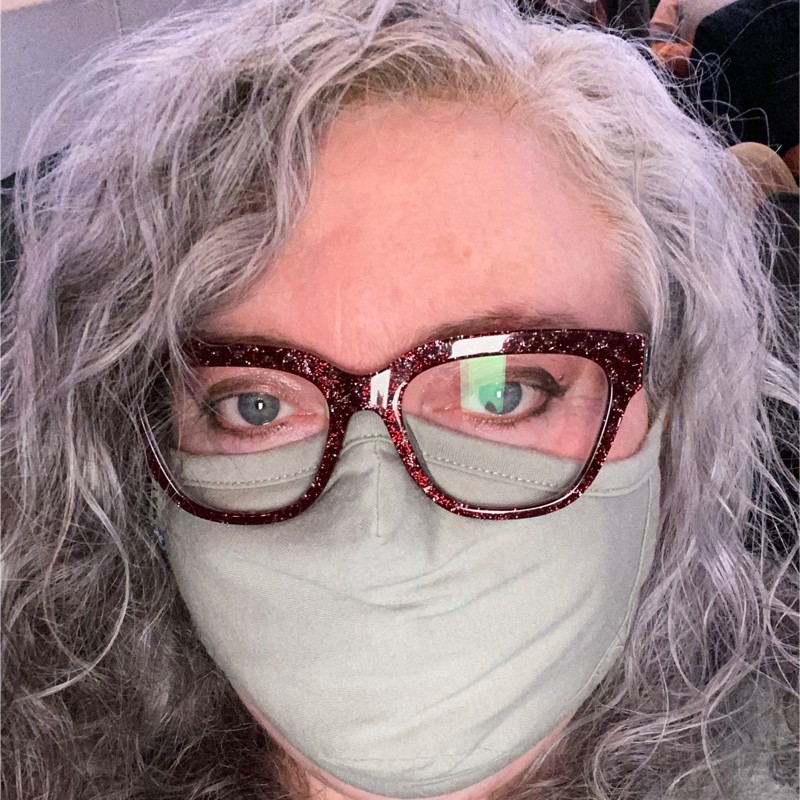Interview with Samantha Evans, CAE

Every week, we meet with audience members with disabilities who are willing to come forward and share a little bit about their own personal journey and experiences, attending live, in-person, or virtual speaking or training events. Through their unique and generous perspectives, speakers, trainers, facilitators, and other communication professionals can hopefully learn about some of the things that they do well, but also (and maybe more importantly) about some of the things they could improve to provide an experience that is truly inclusive of everyone.
Meet Samantha, an audience member who is hard of hearing, has vestibular disorders and dyscalculia
So without further ado, let’s dive right into this week’s interview with Samantha Evans (she/her). Samantha is hard of hearing, has vestibular disorders, and dyscalculia. She comes to us from Georgia, USA.
Introductions
QUESTION 01 Can you tell us a bit about yourself, and how your disability might impact your experience, as someone who attends live in-person and virtual events?
As a person that uses hearing aids, background noise at live events creates real challenges for me. I rely on captions at both live in-person and in virtual meetings/events, but I can do okay with artificial intelligence (AI) captions and/or lip reading in one-on-one dynamics. In a nearby disability, my labyrinthitis causes vestibular issues. Anything that moves in real life and sometimes stairs, escalators, and elevators can do a number on me. At in-person and virtual events, motion graphics and parallax scrolling really set me back. Dyscalculia doesn’t impact me at events, other than in planning calculations.
Things that ruin the experience
QUESTION 02 Thinking back on some of your experiences attending in-person or virtual events, what are some of the worst things speakers, trainers, and other communication experts can do to ruin your experience as an attendee?
Thinking that no one needs a microphone in a group setting, even in small rooms. Lack of captions in either live, in-person or virtual events, can reduce my ability to engage, as it makes for a lot of cognitive load. High-speed graphics, animations, and flashing elements as part of event designs can make me nauseous, or feel like I’m terribly off balance. In digital events, not being able to turn off moving video, gifs, or animated jpgs is enough to make me have to walk away, or turn off the monitor. Scrolling transcripts aren’t my friend either, and I’m not great with scrolling teleprompters at the podium either.
Things that make a positive impact
QUESTION 03 Can you share some of the great things speakers, trainers, and other communication experts sometimes do that make a positive impact on your ability to fully enjoy your in-person or virtual event experiences?
I love closed captions and warnings for motion graphics, or describing what will happen in them, so that I don’t have to miss out on what’s being shared, and when to come back to what’s being shown. Microphones in group Q&A, repeating the questions asked/typed is always great for everyone, not just for me.
Sharing a piece of advice
QUESTION 04 If you had one piece of advice to give speakers, trainers, and other communication experts, so their content became more inclusive of people who have disabilities, what would it be?
Be sure to audio-describe all visual content, which will help your audience, the captioning team, and anyone that might not speak your language as a primary. Captions and microphones are everyone’s friends. Build in breaks, they’re good for the brain and the body. Oh wait, that’s more than one…
Wrapping up
QUESTION 05 Thank you for sharing some of your insights with us today. As we wrap up our conversation, is there anything that you’d like to add, such as another thought, another piece of advice, another perspective, etc.?
I encourage everyone planning events to start baking accessibility into their planning at the strategy phase so that you budget and build in your partners to provide an accessible event. Learn about disabilities, and how to optimize the attendee experience. Engage disabled people in your event planning.
Connect with our guest on social
Interested in knowing more about our guest this week? You can follow Samantha on LinkedIn and Twitter.

About Denis Boudreau
Denis Boudreau is a consultant, trainer, and speaker specializing in digital accessibility and disability inclusion. He works with organizational leaders who want to equip their teams with the skills to create accessible websites and digital products – so no one is left behind. A Certified Professional in Web Accessibility (CPWA), Denis has trained thousands of web professionals over the past 20+ years and delivered hundreds of workshops in both English and French. He has helped leading brands like Netflix, Salesforce, and Victoria’s Secret embed accessibility into their digital strategies, empowering them to meet legal obligations, improve user experience, and connect with more people, more effectively.
